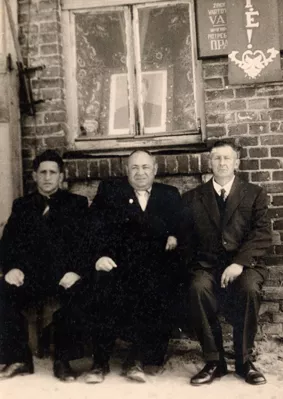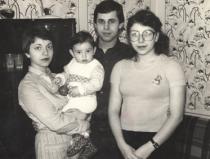This is my father Leible Beitler in the center with his colleagues. The picture was made on a holiday against the background of their office window and Lenin's portrait Zagare, 1950s.
to say. He was tall, strong, meek and kind, the protector of the weak. Grandmother once told a story. When father was 19 he saw a gang of drunk Lithuanians teasing a Jew. He removed a shaft and had the gang leave the place. Father's family was very poor, so he finished only 4 classes of Jewish public school. Then he was apprenticed by a cobbler. Before he turned 22, he helped grandmother and went with her to buy fish. When he got married, she started working as a cobbler.
My father's brother Ruvim was born in 1914. He was a simple man, always doing the jobs that other people were not willing to. He was a stevedore, a janitor, a cobbler etc. During Great Patriotic War he was in evacuation with grandmother's family. When he came back in Lithuania, he married Jewish Pole Lyuba, who came back from Dachau. Ruvim and Lyuba had a son Isaac. He is currently living in Israel with his family 7. He died six years ago, several month before his wife's death.
My parents were sociable, modern and advanced people. I remember how I took lunch to my father's work. He worked as a cobbler at the shop owned by a Jew, then by a Lithuanian. Cobblers were sitting on the stools covered with leather and having leather aprons on bare skin in sultry summer weather. Father was very strong and I remembered his sinews when he was working. Father's best friend Pina Zhukov was also working there. Pina and his came to us on Saturday at times, they were always present at seder. Pina had three sons, which were my age and I liked to communicate with those boys.
In late July 1940 Red Army units came in Lithuania and the Soviets came to power. Jews, mostly poor, were happy for it, as they had a hope for a better life. Not only Jews welcomed Russians, but also poor Lithuanians. There were constant meetings with the soviets, their movies were on. My parents were happy to see the soviets at power. Mother kept working. Father was assigned the chairman of the cooperative society. I do not know what that company was involved in, but father stopped being a cobbler. We started having a better life. I even remember that we bought two pairs of new shoes. My parents could not afford that before.
In late July 1941 my father was drafted in 16 Lithuanian division. Fther went to the front. He was a cabman. He took support staff- tailors, hairdressers, launderers, to the front. He was often on the leading edge and he had to take part in the battles and to smell the powder. We were looking forward to his letters. With 16 division he liberated Vilnius, Siauliai, and Latvia.
After the war my father became the chairman of the cooperative society in Zagare and it was a rather high position. He died in 1961. The town leaders, communists, were at his funeral, so we could not make them Jewish. Though, we put him in a shroud and a suit on the top. When nobody was around we read a Jewish prayer over him. He was buried in Siauliai




















